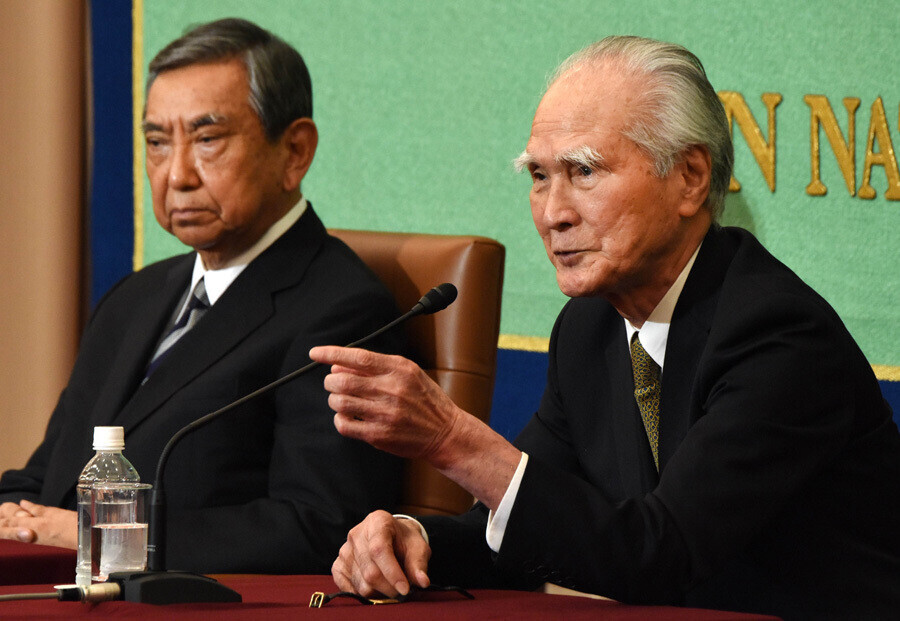hankyoreh
Links to other country sites 다른 나라 사이트 링크
[Column] What does the end of historical issues look like?

In Japan, South Korea is widely seen as a country that does not keep its promises, one that has been apologized to and compensated yet keeps asking for more.
I once went to see a roundtable organized by a university in Tokyo while I was there in 2018. I remember being astonished to see a Japanese professor use the term “victim stalkers” to refer to the incessant demands for apologies when talking about the forced labor mobilization and comfort women issues. The event in question was attended by South Korean professors and discussants.
I can’t say I don’t understand the climate in Japan at all. South Korea and Japan signed a Claims Settlement Agreement in 1965 and an intergovernmental agreement on the issue of wartime military sexual slavery in 2015.
It’s also true that the Japanese government has apologized a number of times already: in a 1993 statement by then-Chief Cabinet Secretary Yohei Kono acknowledging the forcible nature of the comfort women’s mobilization, in a 1995 statement by then-Prime Minister Tomiichi Murayama expressing remorse for colonial occupation and war of aggression, and in a 2010 statement by then-Prime Minister Naoto Kan reaffirming the illegality of Japan’s colonial occupations.
But it is also Japan that bears responsibility for fundamentally undermining these apologies.
In 2013, then-Prime Minister Shinzo Abe paid respects at Yasukuni Shrine, where recognized war criminals have been enshrined. The following year, he began an investigation into “issues” with the testimony of comfort women survivors that had served as a basis for the Kono statement.
When months of investigation failed to turn up any evidence to warrant revising the statement, Abe focused on finding faults with it, claiming that South Korea and Japan had “coordinated on the language.” By emphasizing that the statement was the result of a political compromise, he offered support to right-wingers who deny that the recruitment of comfort women was forcible in nature, or that Japan bears responsibility for it.
Japan’s historical revisionism has not ended there. Accounts about the comfort women and labor mobilization are being removed from middle and high school history textbooks. The exhibition of a comfort women statue at Japan’s largest international art festival in 2019 was halted after three days due to right-wing intimidation tactics, abetted by the government.
This sent the clear message that no comfort women statues would be allowed in Japan, even as works of art.
I also recall the Japanese government using every means at its disposal last October to press for the removal of a comfort women statue that had been raised by members of local civil society in Germany. Japanese hate speech toward Zainichi Koreans and others remains a serious problem.
When it comes to historical issues, Japan insists that it’s all “in the past,” and that we shouldn’t talk about it anymore. But how can this problem ever come to an end when Tokyo uses its two agreements and Prime Ministers’ statements purely as a way to hush things up so that its historical shame is not exposed?
In a recent interview with the Asahi Shimbun newspaper, attorney Masatoshi Uchida — who is currently working toward resolving the issues of forced labor mobilization and Japan’s responsibility for the war — said three things would be needed for South Korea and Japan to achieve reconciliation.
The perpetrators would need to acknowledge and apologize for what happened and their responsibility for it, they would need to provide financial compensation as proof of this, and they would need to inform future generations about the issue to ensure the same misdeeds are not repeated in the future. Without the third of these, he stressed, any agreements on the first two could not be preserved.
Chung Byung-ho, a Hanyang University emeritus professor of cultural anthropology, has spent over 20 years working to exhume the remains of victims of forced labor and has organized a joint East Asia workshop with students from South Korea and Japan. Chung shared his thoughts at an international symposium last November.
“While relationships of economic dependence have deepened in East Asia, the walls remain high,” he said.
“Purely functional, superficial encounters that take place amid a lack of even the bare minimum of common understanding about the past can end up actually intensifying each side’s preconceptions and fixed ideas.”
Even if the Japanese government argues that diplomatic agreements have been reached, it can’t be said that historical issues simply stop there. When it comes to historical issues that involve victimization, there are many things the two sides will need to do in order to establish a “common understanding” and “inform future generations.”
In my opinion, we can only begin to find our way toward a resolution once we acknowledge that historical issues can’t simply be declared “over and done with.”

By Kim So-youn, Tokyo correspondent
Please direct comments or questions to [english@hani.co.kr]

Editorial・opinion
![[Editorial] Penalties for airing allegations against Korea’s first lady endanger free press [Editorial] Penalties for airing allegations against Korea’s first lady endanger free press](https://flexible.img.hani.co.kr/flexible/normal/500/300/imgdb/original/2024/0502/1817146398095106.jpg) [Editorial] Penalties for airing allegations against Korea’s first lady endanger free press
[Editorial] Penalties for airing allegations against Korea’s first lady endanger free press![[Editorial] Yoon must halt procurement of SM-3 interceptor missiles [Editorial] Yoon must halt procurement of SM-3 interceptor missiles](https://flexible.img.hani.co.kr/flexible/normal/500/300/imgdb/child/2024/0501/17145495551605_1717145495195344.jpg) [Editorial] Yoon must halt procurement of SM-3 interceptor missiles
[Editorial] Yoon must halt procurement of SM-3 interceptor missiles- [Guest essay] Maybe Korea’s rapid population decline is an opportunity, not a crisis
- [Column] Can Yoon steer diplomacy with Russia, China back on track?
- [Column] Season 2 of special prosecutor probe may be coming to Korea soon
- [Column] Park Geun-hye déjà vu in Yoon Suk-yeol
- [Editorial] New weight of N. Korea’s nuclear threats makes dialogue all the more urgent
- [Guest essay] The real reason Korea’s new right wants to dub Rhee a founding father
- [Column] ‘Choson’: Is it time we start referring to N. Korea in its own terms?
- [Editorial] Japan’s rewriting of history with Korea has gone too far
Most viewed articles
- 160% of young Koreans see no need to have kids after marriage
- 2Months and months of overdue wages are pushing migrant workers in Korea into debt
- 3Presidential office warns of veto in response to opposition passing special counsel probe act
- 4[Editorial] Penalties for airing allegations against Korea’s first lady endanger free press
- 5Hybe-Ador dispute shines light on pervasive issues behind K-pop’s tidy facade
- 6Historic court ruling recognizes Korean state culpability for massacre in Vietnam
- 7Japan says it’s not pressuring Naver to sell Line, but Korean insiders say otherwise
- 8Story of massacre victim’s court victory could open minds of Vietnamese to Korea, says documentarian
- 9Historic verdict on Korean culpability for Vietnam War massacres now available in English, Vietnames
- 10Bills for Itaewon crush inquiry, special counsel probe into Marine’s death pass National Assembly